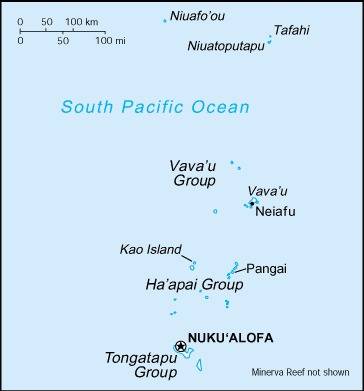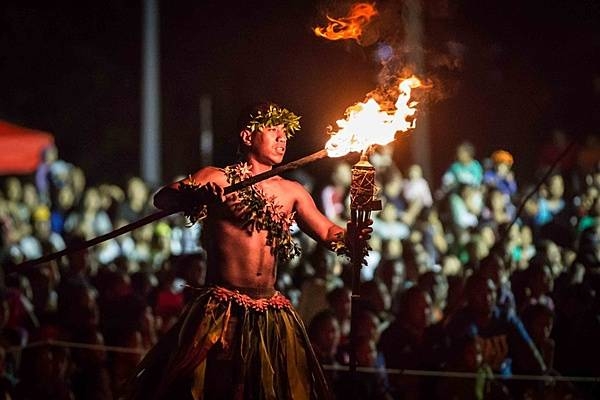51 Tonga

Red with a bold red cross on a white rectangle in the upper hoist-side corner. The cross reflects the deep-rooted Christianity in Tonga, red represents the blood of Christ and his sacrifice, and white signifies purity.
Flag courtesy of the CIA World Factbook

Map courtesy of the CIA World Factbook

A Tongan fire dancer lights a torch during the Coronation Military Tattoo in Nuku’alofa, on 7 July 2015. A tattoo is comprised of military units both musical and operational, from different countries, performing musically as well as demonstrating military capabilities.
Photo courtesy of the CIA World Factbook
Government
According to Britannica, Tonga’s constitution, granted in 1875 by King George Tupou I and amended only slightly since, established a constitutional monarchy. The chief executive is the monarch, who governs in close consultation with the prime minister in all matters except the judiciary; the monarch alone holds the power to appoint judges, grant clemency, and commute prison sentences. The monarch appoints a Privy Council, which consists of the monarch and the cabinet. The cabinet has a prime minister, a deputy prime minister, other ministers, and the governors of Ha‘apai and Vava‘u. The unicameral Legislative Assembly (Fale Alea) has 26 seats: 9 hereditary nobles are elected by their peers, and 17 representatives are directly elected for three-year terms by all citizens age 21 and over. Local government is provided by three island councils: one covering ‘Eua, the Niuas, and Tongatapu, one for the Vava‘u Group, and one for the Ha‘apai Group. The Privy Council acts as part of the court system as well as assisting the monarch in an advisory capacity; it hears appeals from the land court. The Court of Appeal has jurisdiction over civil and criminal appeals from the Supreme Court. The Supreme Court hears cases on matters arising under the constitution and laws of the kingdom, except for cases concerning titles to land. There are also magistrates’ courts and a land court. Judges are appointed by the monarch with the consent of the Privy Council and serve indefinite terms unless removed for cause.
Pacific Aviation Safety Office (PASO)
The Pacific Aviation Safety Office (PASO) is an international organization providing quality aviation safety and security service for Member States in the Pacific.
PASO is the sole international organization responsible for regional regulatory aviation safety oversight service for the 10 Pacific States who are signatories to the Pacific Islands Civil Aviation Safety and Security Treaty (PICASST).
The current PICASST signatories are the Pacific nations of Cook Islands, Kiribati, Nauru, Niue, Papua New Guinea, Samoa, Solomon Islands, Tonga, Tuvalu, and Vanuatu. Associate Members of PASO are Australia, Fiji and New Zealand. Government representatives from these nations make up the PASO Council.
Ministry of Infrastructure – Civil Aviation
Ministry of Infrastructure – Civil Aviation
Airspace
SkyVector – Google Maps – ADS-B Exchange
ICAO countries publish an Aeronautical Information Publication (AIP). This document is divided into three parts: General (GEN), En Route (ENR) and Aerodromes (AD). ENR 1.4 details the types of airspace classes they chose to adopt from classes A through G.
Drone Regulations
Tonga Civil Aviation Rules (CARs) – They follow a modified version of New Zealand’s Civil Aviation Rules, but Part 101 and Part 102 which pertain to drone regulations and are not included in this document.
Advanced Air Mobility (AAM) Regulations & Policies
Advanced Air Mobility (AAM) News
None found by the author.
However, should you, the reader, happen to stumble across something to the contrary, please email the author at FISHE5CA@erau.edu and you may be mentioned in the ACKNOWLEDGEMENTS section of this book by way of thanks for contributing to this free eBook!
Short Essay Questions
Scenario-Based Question
You have been hired by a Drone Startup Company. Your boss has immediately assigned this job to you.
They need you to prepare a one-page memo detailing the legalities of using a drone at night to film a Tongan fire dancer during the Coronation Military Tattoo in Nuku’alofa, pictured above.
They need you to mention any national laws and local ordinances.
They specifically want to know what airspace (insert pictures) you will be operating in and whether or not you need an airspace authorization.
Does it matter whether or not you are a citizen of the country?
Lastly, there is a bonus for you if, as you scroll through this chapter, you find any typos or broken links!
Short Essay Questions
- What are the drone categories?
- How is registration addressed?
- How is remote ID addressed?
- What are the model aircraft rules?
- What are the commercial drone rules?
- Are there waivers or exemptions to the rules? If so, for what?
- Would you share a link to an interactive airspace map?
- How is BVLOS addressed?
- How can you fly drones at night?
- How can you fly drones over people?
- Where do you find drone NOTAMs?
- What are the rules for drone maintenance?
- What are the rules for an SMS program?
- What are some unique rules not mentioned above?
- What are the C-UAS rules?
- What are the AAM rules?

